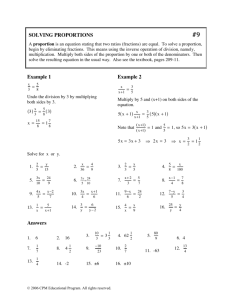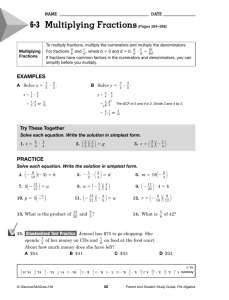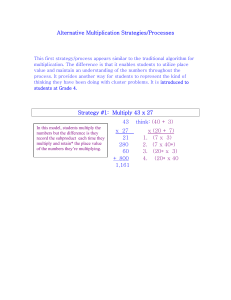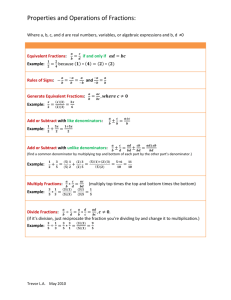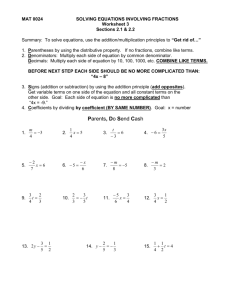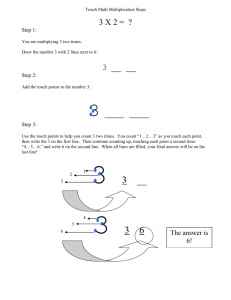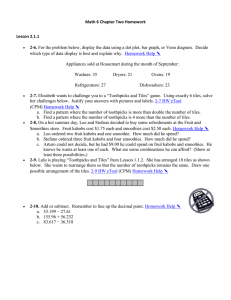Multiplication of Fractions with an Area Model
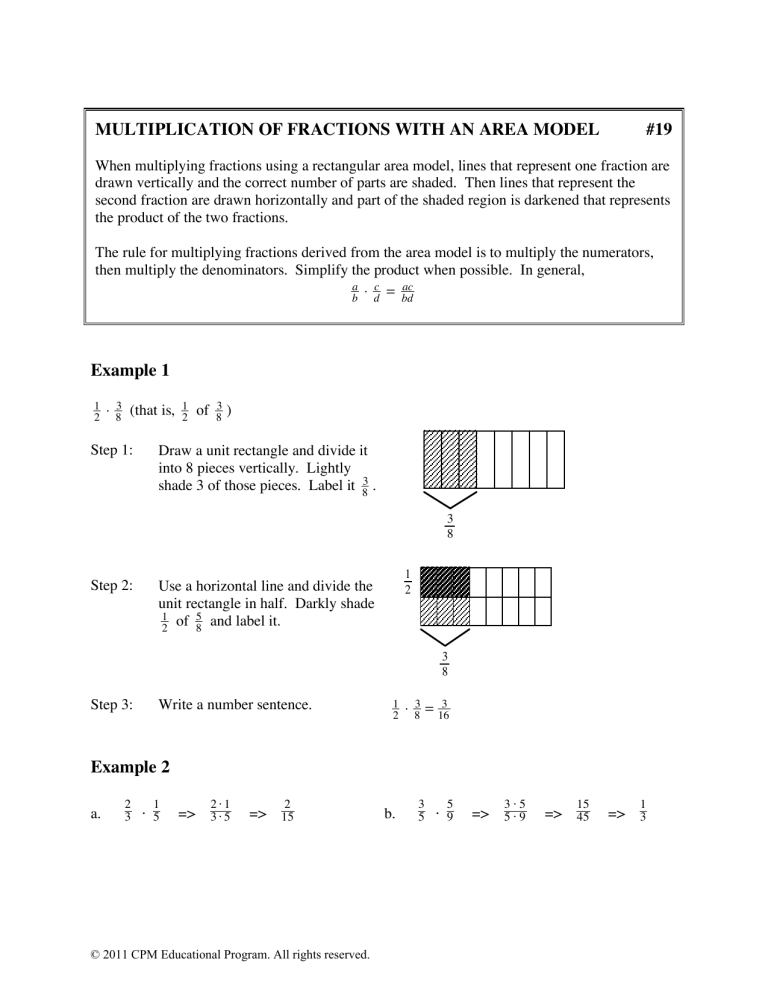
MULTIPLICATION OF FRACTIONS WITH AN AREA MODEL #19
When multiplying fractions using a rectangular area model, lines that represent one fraction are drawn vertically and the correct number of parts are shaded. Then lines that represent the second fraction are drawn horizontally and part of the shaded region is darkened that represents the product of the two fractions.
The rule for multiplying fractions derived from the area model is to multiply the numerators, then multiply the denominators. Simplify the product when possible. In general, a b
!
!
!
c d
!
= !
ac bd
Example 1
1
2
!
!
!
3
8
(that is, 1
2
of 3
8
)
Step 1: Draw a unit rectangle and divide it into 8 pieces vertically. Lightly shade 3 of those pieces. Label it 3
8
.
Step 2: Use a horizontal line and divide the unit rectangle in half. Darkly shade
1
2
of 5
8
and label it.
1
2
Step 3: Write a number sentence. 1
2
!
!
!
3
8
= 3
16
3
8
3
8
Example 2 a.
2
3
·
1
5
=>
2 · 1
3 · 5
=>
2
15 b.
3
5
·
5
9
=>
3 · 5
5 · 9
=>
15
45
=>
1
3
© 2011 CPM Educational Program. All rights reserved.
Problems
Draw an area model for each of the following multiplication problems and write the answer.
1.
1
3
·
5
6
2.
3
4
·
2
5
3.
1
3
·
4
9
Use the rule for multiplying fractions to find each product. Simplify when possible.
4.
2
3
·
2
7
5.
2
3
·
2
5
6.
3
7
·
2
5
7.
4
9
·
1
3
8.
2
3
·
5
8
9.
5
7
·
2
5
10.
4
7
·
3
4
11.
5
12
·
2
3
12.
4
7
·
1
2
13.
5
8
·
4
5
14.
5
9
·
3
5
15.
7
10
·
2
7
16.
5
12
·
6
9
17.
5
6
·
3
20
18.
10
13
·
3
5
20.
7
10
·
5
14
19.
7
12
·
3
7
Answers
1.
5
18
2.
6
20
=
3
10
3.
4
27
5
6
2
5
4
9
1
3
3
4
1
3
4.
4
21
5.
4
15
6.
6
35
7.
4
27
8.
10
24
=
5
12
9.
10
35
=
2
7
10.
12
28
=
3
7
11.
10
36
=
5
18
12.
4
14
=
2
7
13.
20
40
=
1
2
14.
15
45
=
1
3
15.
14
70
=
1
5
16.
30
108
=
5
18
17.
15
120
=
1
8
18.
30
65
=
6
13
19.
21
84
=
1
4
20.
35
140
=
1
4
© 2011 CPM Educational Program. All rights reserved.
MULTIPLICATION OF MIXED NUMBERS
There are two ways to multiply mixed numbers. One is with generic rectangles. You can also multiply mixed numbers by changing them to fractions greater than 1, then multiplying the numerators and multiplying the denominators. Simplify if possible.
Example 1
Find the product:
Step 1:
1
1
2
!
!
!
1
1
3
Draw the generic rectangle. Label the top
1 plus 1
3
. Label the side 1 plus . 1
2
1
1 +
1
3
Step 2:
Step 3:
Example 2
Write the area of each smaller rectangle in each of the four parts of the drawing.
Find the total area:
1
+ 1
3
+ 1
2
+ 1
6
=> 1
+ 2
6
+ 3
6
+ 1
6
=> 1 6
6
=> 2
Write a number sentence: 1
1
2
!
!
!
1
1
3
=
2
Find the product: 2 1
3
!
!
!
2 1
2
4 + 1 + 2
3
+ 1
6
=> 5 + 4
6
+ 1
6
=> 5 5
6
+
1
2
+
1
2
1
1 1 · 1 = 1
+
1
3
1 ·
1
3
=
1
3
1 ·
1
=
2
1
2
2
2 +
2 · 2 = 4
1
2
2 ·
1
2
= 1
+
1
3
2 ·
1
3
=
2
3
1
2
·
1
=
3
1
6
1
3
·
1
=
2
1
6
© 2011 CPM Educational Program. All rights reserved.
Problems
Use a generic rectangle to find each product.
2. 2
1
6
· 2
1
3
3. 2
3
4
· 2
1
2
1. 2
1
4
· 1
1
2
Answers
1.
27
8
or 2
3
8
2.
91
18
or 5
1
18
3.
4. 1
1
3
· 2
1
6
55
8
or 6
7
8
4.
52
18
or 2
16
18
2 +
1
4
2 +
1
3
2 +
1
2 or 2
8
9
2 +
1
6
5. 2
1
2
· 1
1
6
5.
35
12
or 2
11
12
1 +
1
6
1 2
1
4
2 4
2
3
2 4
1
1 2
1
6
2 2
2
6
=
1
3
+
1
2
1
1
8
+
1
6
2
6
1
18
+
3
4
6
4
3
8
+
1
3
2
3
1
18
+
1
2
1
2
Example 3
1
1
2
· 1
1
3
!
3
2
·
4
3
!
2
3 · 4
· 3
!
12
6
!
2
Problems
Find each product, using the method of your choice. Simplify when possible.
1. 2
1
4
· 2
5
8
2. 2
1
5
· 2
1
5
3. 1
3
8
· 1
5
6
5. 1
2
7
· 1
1
7
9. 2
1
3
· 1
2
7
Answers
6. 2
4
7
· 3
8
9
10. 2
2
5
· 2
3
10
7. 2
3
7
· 1
1
12
4. 2
5
9
· 2
5
6
8. 2
7
9
· 2
4
5
1.
189
32
or 5
29
32
5.
72
49
or 1
23
49
9. 3
2.
121
25
or 4
21
25
6. 10
10.
138
25
or 5
13
25
3.
7.
121
48
or 2
25
48
221
84
or 2
53
84
4.
8.
391
54
or 7
13
54
70
9
or 7
7
9
1
12
© 2011 CPM Educational Program. All rights reserved.
